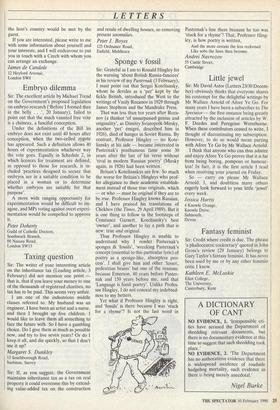Sponge v fossil
Sir: Grateful as I am to Ronald Hingley for the warning 'about British Russia-fanciers' in his review of my Pasternak (3 February), I must point out that Sergei Koteliansky, whom he derides as a 'pet' kept by the fickle British, introduced the West to the writings of Vasily Rozanov in 1929 through James Stephens and the Mandrake Press.
That was less than ten years after Roza- nov (a thinker 'of unsurpassed genius and originality', as Dimitry Sviatopolk-Mirsky, another 'pet' émigré, described him in 1926), died of hunger in Soviet Russia. By contrast, Professor Hingley — no Kote- liansky at his side — became interested in Pasternak's posthumous fame some 30 years after the last of his verse without `rival in modern Russian poetry' (Mirsky again, in 1926) had been written.
Britain's Kotelianskys are few. So much the worse for Britain's Hingleys who prof- fer allegiance to their academic establish- ment instead of those true originals, which — or who — must be original if they are to be true. Professor Hingley knows Russian, and I have praised his translations of Chekhov (the Times, 29 April 1989). But it is one thing to follow in the footsteps of Constance Garnett, Koteliansky's best 'owner', and another to lay a path that is new: true and original.
Thus Professor Hingley is unable to understand why I render Pasternak's sponges dk 'fossils', 'wrecking Pasternak's concept (essential to this particular lyric) of poetry as a sponge-like, absorptive pro- cess'. I shall give him and other 'lesser, pedestrian brains' but one of the reasons: because Emerson, 80 years before Paster- nak and 150 years before me, said that `Language is fossil poetry'. Unlike Profes- sor Hingley, I do not conceal my indebted- ness to my betters.
Yet what if Professor Hingley is right, and 'fossils' is there because I was 'stuck for a rhyme'? Is not the last word in Pasternak's line there because he too was `stuck for a rhyme'? That, Professor Hing- ley, is how poetry is written,
And the more certain the less reckoned Like sobs the lines then become,
Andrei Navrozov
55 Castle Street, Cambridge


















































 Previous page
Previous page